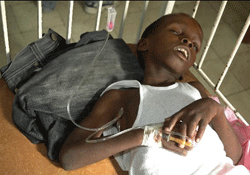Election farce solves none of Haiti's problems
Haiti, of course, has bigger problems than a bogus election. And in fact that was a complaint heard on the ground – why was money being wasted on an electoral circus when people do not have access to drinking water, and the country is in the midst of a cholera epidemic? The latter crisis seems to have been pushed off the world's radar screen by the election, despite the fact that the United Nations has been able to raise only around 10 percent of the $164 million they need to treat what is estimated to grow to 400,000 cases of cholera in the next year.
|
Don't miss: Haiti cholera outbreak |
 |
And then there is the unbelievable failure of the reconstruction itself. Nearly a year after the earthquake, less than 2 percent of the rubble has been cleared, and less than 10 percent of the 1.5 million people made homeless by the earthquake have shelter. Most of the rest are living under tarps, with the earth beneath them turning to water and mud when it rains – the international community could not even get them tents.
But the bogus election matters because, if allowed to stand, it will confer an illegitimate government on Haiti. For most of its existence and until quite recently, Haiti was ruled by illegitimate governments that relied heavily on violence to maintain power. Aristide was the first democratically elected president, in 1990. He was overthrown seven months later but eventually re-elected in 2000. Because his government was legitimate and did not have to rely on violence, he abolished the army – which was the main instrument of political violence. Washington never forgave him for this, and organized an international cut-off of aid to the country, while pouring tens of millions of dollars into the opposition, thus toppling the government.
In April of 2009, an election that also excluded the largest political party drew a boycott of about 90 percent of the electorate. Participation in this latest election appears to have been higher (although lower than the previous presidential election), but it will not be seen as legitimate. This has already increased social unrest. There is no longer a Haitian Army, but there is a badly-trained national police force and a UN military force (MINUSTAH) that is widely seen as an occupying army and notorious for its violence and human rights abuses. Its standing has fallen even further as it appears to be the source of the cholera epidemic.
Haiti needs a government that can contribute to the reconstruction of the country, its public health, and the institutions necessary to promote economic development and employment. An illegitimate government won't meet any of these needs, and brings the risk of increasing political violence.
This column was first published by The Guardian Unlimited (UK) on December 1, 2010.
 0
0 







Go to Forum >>0 Comments